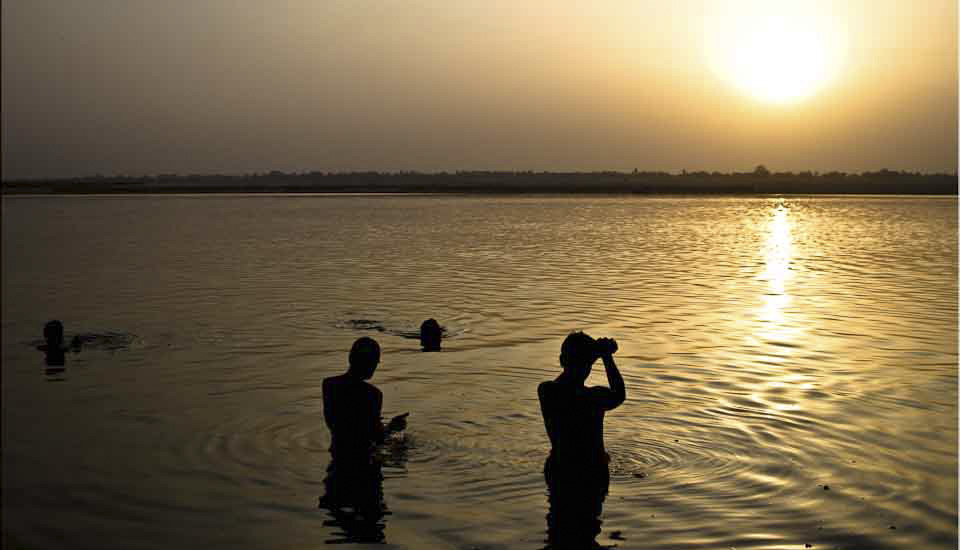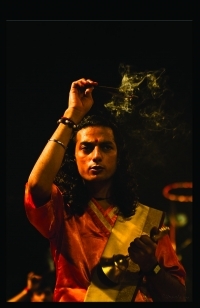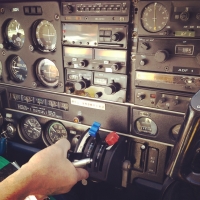.jpg)
Family on the Hill
Smiling people sitting in the dirt on a hill overlooking colourful multi-story houses and endlessly terraced hills: where else could you be, but Nepal?
They say every journey begins with a single step.
Even so, when I heard that the penultimate leg of our walk for the day was the ominously named “1000 steps”, I worried. In Nepal, “steps” always means up, not just forward! I can outstrip a lot of people on the flat, but present me the slightest incline, and these days it stops me in my tracks.
It was day two of the “easy” hike around the East Kathmandu Valley in Nepal. Google Maps puts the walk from Namo Buddha to Dhulikhel (following the route we took; via Phoolbari/Phulbari) at 11.6 km (7.2 mi), and suggests that it should take about three hours and twenty minutes; with detours and stops, it took us closer to seven hours, and it felt a LOT further! Oh, the joys of ageing.
We started our morning with chanting and breakfast with the monks at the Thrangu Tashi Yangtse Monastery (see: Dal Bhat and Prayers) before working our way down the steps and path to the village commonly known as Namo Buddha. After that, it was a case of following our guide, Angfula Sherpa, as the forking paths wound through woods and fields and villages … and finally – up those steps!
Of course, there were plenty of excuses to stop for photos, or a chat with locals, or a delicious plate of momos – which might be why we took so long!
.jpg)
Namo Buddha Stupa
This stupa is said to house the bones of Mahasattva (Semchen Chenpo) who gave up his body to a tigress who was starving while trying to feed her cubs. It was later determined that Mahasattva was an earlier incarnation of the Gautama (Shakyamuni) Buddha.
.jpg)
Old Woman Perambulating
For Nepali and Tibetan Buddhists, this is one of the holiest pilgrimage sites in Nepal.
It is customary to walk around any stupa three times in a clockwise direction, spinning the prayer wheels and repeating prayers or mantras.

Pilgrims at the Market
Pilgrims buy incense, candles, prayer flags and other religious items to help expedite their prayers.

Small Shrine
The lighting of candles or lamps represents the knowledge of the Buddha symbolically illuminating the darkness of ignorance.

Affixing Prayer Flags on the Stupa
The religious sites in Nepal are well-tended. There was an old woman looking after the shrine here, and this young man applied a fresh coat of whitewash to the stupa before scaling it to affix the new prayer flags someone had purchased.

Namo Buddha Stupa
This site was originally called Takmo Lujin – Tibetan for “giving the body to the tigress” – but villagers were afraid of invoking the tigers that still roamed these hills, and called it Namo Buddha – Nepali for “homage to the Buddha” instead.

Looking Back at the Thrangu Tashi Yangtse Monastery
It feels like we are going nowhere as we trek up out of Namo Buddha. But then, only half an hour later, we can see the the monastery where we spent the night – perched on a hill far behind us!

Terraced Hill
Terraced hills, planted with Nepal’s principal food supply are all around us.

Wildflowers on the Path
The signs of spring rise from the verges …

Yellow Flowering Shrubs
… and line the sides of the paths we are walking.

Gathering Grain
Everywhere we go, people are hard at work. Winter wheat is generally harvested early- to mid-March here in the valley. I’m guessing that is what these women are sorting.

View to the Valleys
The sun rises to it’s zenith, warming us and the hills around us.

Kids in the Schoolyard
Our next impromptu stop was at a tiny “Community School”, where the children were on the ground outside with a “teacher” not much older than themselves.

Temple in the Dirt
Any village big enough for a school will certainly have a shrine and/or temple and/or stupa.

Village on the Hill
Some of the hillsides are terraced with colourful villages, rather than just crops.

Women at Work
The women are all hard at work, but they are still ready with a quick smile for the strangers.

Woman and her Goats
This woman was very keen to show me her baby kids.

Building or Rebuilding?
The effects of the 2015 earthquake are still much in evidence. Watching some projects, it is hard to tell if people are building from scratch, or rebuilding a ruin. Certainly, recovered materials are in use everywhere.

Making Ornaments
In a tin shed at a fork in the road, I found a man crafting ornaments from carved cow horn and metal.

A Man and his Birds
“He’s not from around here,” was all anyone could tell me. Still, the birds were sweet and inexpensive; I went home with a couple.

Dhulikhel Height Resort
This had to be the highlight of our day! It was mid-afternoon when we climbed the rise to the modestly-built, elaborately-named: Dhulikhel Height Resort.

Momos
When I hear “momos”, I can climb any rise; and these were good. Very, very, good.

Golden Buddha
We paid quick respects to Dhulikhel’s giant golden Buddha before working our way through town …

View from my Room
… and to our home for the night: the Dhulikhel Lodge Resort. I couldn’t wait to get my boots off and just sit on my balcony, overlooking the mountains.
As is always the case in Nepal, every step was worth it.
Looking out my window over the mountains around me, I almost forgot my blisters and the pains in my muscles, my hip and my knees.
 Almost!
Almost!
Till next time,
Namaste!
Photos: 7March2017




























.png)


[…] and photojournalist Jack Kurtz. When we weren’t exploring various outdoor locations (e.g: A Thousand Steps, Boudhanath Stupa, Bhaktapur Ruins, and Swayambhunath, etc.), we were grouped in an airy Airbnb […]